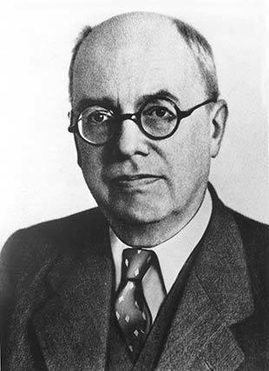Ernst Robert Curtius facts for kids
Ernst Robert Curtius (born April 14, 1886 – died April 19, 1956) was a German expert in literature. He was also a philologist, which means he studied languages and old texts. He was known for his ideas about French and Latin literature. His most famous work is a book from 1948 called European Literature and the Latin Middle Ages. This book showed how ancient Latin writings influenced all of European literature.
Ernst Robert Curtius: His Life Story
Ernst Robert Curtius was born in Thann, a town in Alsace. His family came from northern Germany. His grandfather, Ernst Curtius, and his great-uncle, Georg Curtius, were also famous scholars.
When Ernst was young, his family moved to Strasbourg. This was because his father, Friedrich Curtius, became the head of the Lutheran Church there. Ernst went to school in Strasbourg and later studied at the University of Strasbourg.
He traveled a lot in Europe and learned to speak French and English very well. A famous person named Albert Schweitzer lived with his family for a few years. Schweitzer helped Curtius learn about modern French literature.
Curtius studied languages and philosophy in Strasbourg, Berlin, and Heidelberg. He finished his main studies in 1910. In 1913, he wrote a special paper to become a university teacher in Bonn. He started teaching there in 1914.
His teaching was stopped by World War I. Curtius served in the army in France and Poland. He was hurt in 1915 and had to leave the army in 1916. After that, he went back to teaching in Bonn. In 1924, he became a professor of Romance Philology at Heidelberg University.
Ernst Robert Curtius: His Important Work
Much of Curtius's important work happened when the Nazis were in power in Germany. He was very interested in humanist studies. This means he focused on human values and classical learning. Many people see his work as a way to push back against the strict, controlling ideas of that time.
Curtius believed that all European literature was connected. He thought it was one long story that started with ancient Greek and Latin writers. He felt this story continued through the Middle Ages and beyond. He did not think there was a big break between these different time periods. He believed that literature from different countries was also connected, not separate.
He loved French literature. Early in his career, he encouraged people in Germany to study it. This was brave because at that time, France was seen as an enemy. Some people in Germany who were very nationalistic did not like his ideas.
His most famous book, European Literature and the Latin Middle Ages, came out in 1948. This book explores how Latin literature from the Middle Ages influenced later writing in modern European languages.
Curtius made two main points in his book:
- First, he argued that dividing literature into "Classic," "Medieval," "Renaissance," and "Modern" was not helpful. He believed there was a continuous flow between these periods.
- Second, he showed that you cannot fully understand much of later European literature without knowing about Medieval Latin writing. This is because writers often used similar ideas, metaphors, and phrases. Curtius called these ideas topoi (say: TOY-poy).
His book helped make the idea of a "literary topos" famous. A topos is a common theme or idea that appears again and again in literature.
See also
 In Spanish: Ernst Robert Curtius para niños
In Spanish: Ernst Robert Curtius para niños


